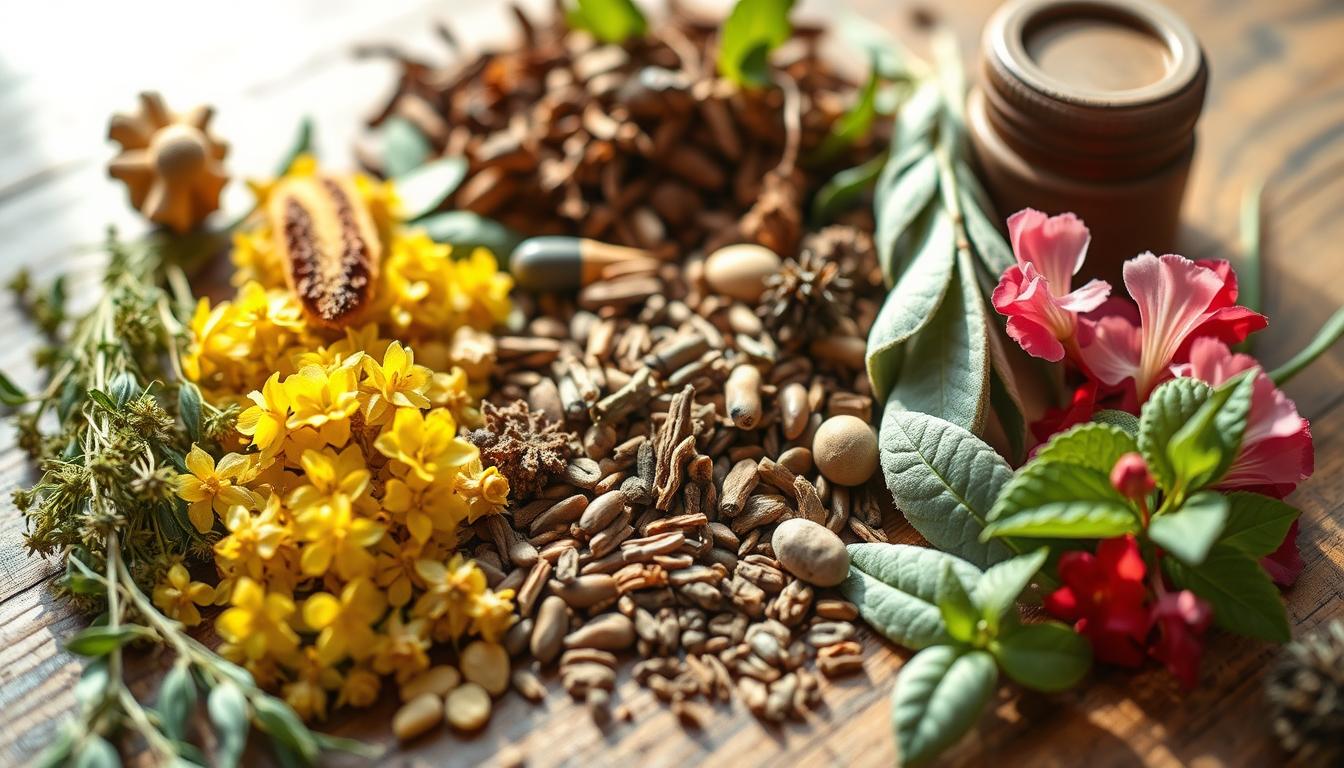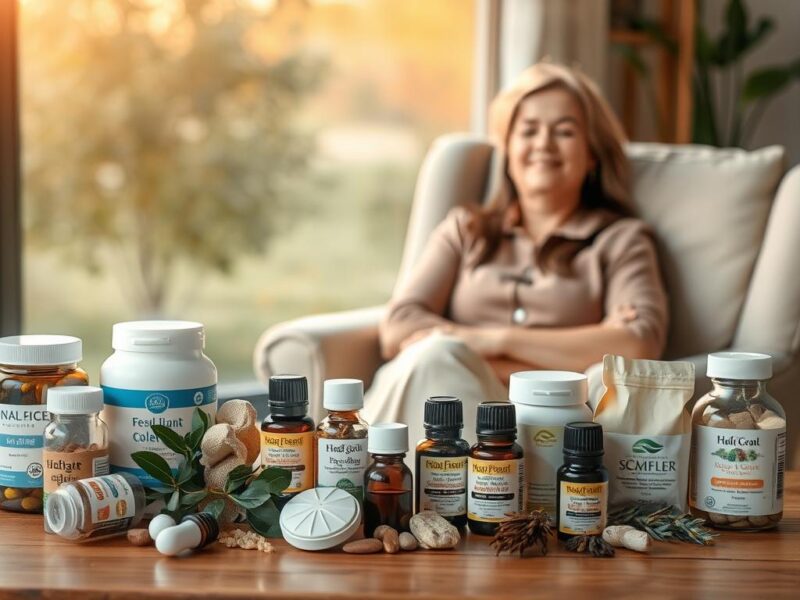When hot flashes strike at midnight or fatigue drags you down midday, hormone therapy might feel like your only option. But what if nature offers alternatives? Millions of women are turning to plant-based solutions to manage common challenges like night sweats, mood swings, and sleep disruptions.
This guide explores science-backed options that work with your body, not against it. From research-backed plant-based solutions to traditional herbs with modern clinical support, you’ll discover practical ways to regain balance. We’ve combed through studies on ingredients like black cohosh – shown in a 2023 trial to reduce symptoms by 34% – and other botanicals that target specific needs.
While these approaches show promise, your safety comes first. Always consult your healthcare provider before trying new supplements, especially if you take medications. We’ll walk through what works, what doesn’t, and how to personalize your approach.
Key Takeaways
- Herbal options may reduce hot flashes and improve sleep quality
- Clinical trials support specific plants like black cohosh
- Personalized approaches work better than one-size-fits-all solutions
- Quality matters – learn how to choose effective products
- Medical guidance ensures safe integration with your health plan
Introduction to Herbal Remedies and Menopause
Your body’s transition through menopause isn’t just about ending periods. It’s a whole-body shift that can turn daily life upside down. Fluctuating estrogen levels affect everything from brain fog to bone health – and that’s where natural solutions come into play.
Understanding Menopause and Its Impact on Your Body
When estrogen production slows, your nervous system, metabolism, and temperature control get jumbled. This leads to:
| Symptom | Physical Effect | Mental Effect |
|---|---|---|
| Hot flashes | Sudden heat surges | Anxiety spikes |
| Sleep issues | Nighttime sweating | Daytime irritability |
| Mood swings | Hormone fluctuations | Concentration lapses |
Recent studies suggest plant-based supplements might ease these effects. Black cohosh, for example, showed a 29% reduction in hot flash frequency in a 2022 trial published in Menopause Journal.
Why Consider Natural Relief Options?
Many people prefer botanicals because they target symptoms without synthetic hormones. Evening primrose oil users in a 2023 survey reported:
- Better sleep quality (67%)
- Milder mood swings (58%)
“Phytoestrogens in plants may gently support hormonal balance, unlike prescription therapies that override natural systems.”
Experts at Johns Hopkins Medicine note growing interest in non-hormonal approaches. While results vary, combining herbs with lifestyle changes often brings personalized relief.
Recognizing Menopausal Symptoms and Challenges
Waking up drenched at 3 AM? You’re not alone. Menopause brings waves of physical and emotional changes that can catch you off guard. Knowing what’s happening helps you tackle it strategically.
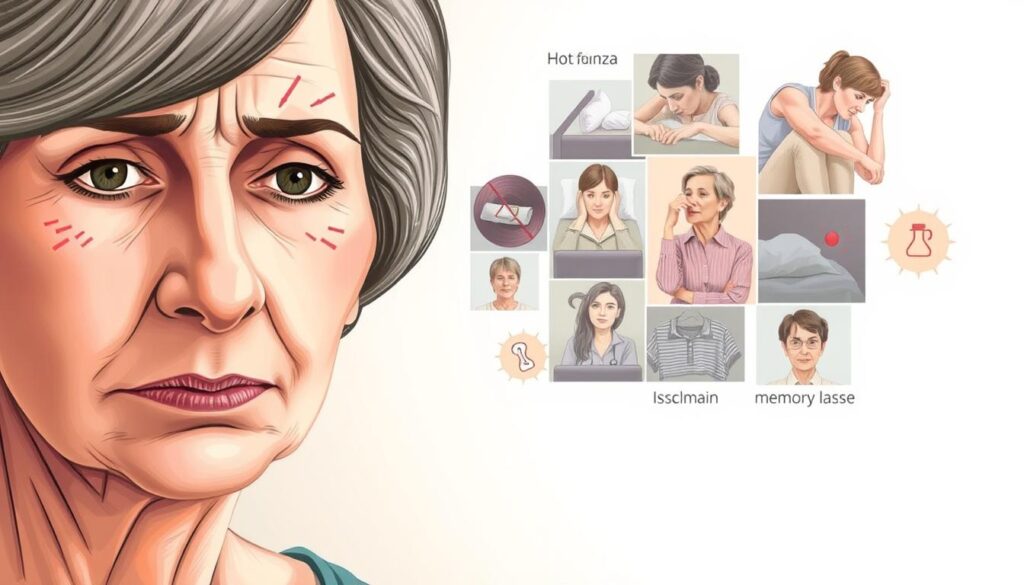
Identifying Hot Flashes, Night Sweats, and Sleep Disruptions
Hot flashes aren’t just warm moments – they’re sudden heat surges that redden your skin and spike your heart rate. Night sweats often follow, with 73% of women in a 2023 study reporting drenched sheets at least weekly. This cycle wrecks sleep quality, leaving you foggy-headed by noon.
| Symptom | Frequency | Daily Impact |
|---|---|---|
| Hot flashes | 4-10/day | Work focus issues |
| Night sweats | 3-7/week | Daytime exhaustion |
| Sleep disruptions | 5+ nights/week | Memory lapses |
A 2021 clinical review found women with frequent night sweats had 42% higher stress hormone levels. Your body’s thermostat isn’t broken – it’s recalibrating.
Other Common Menopausal Symptoms You May Experience
Beyond temperature chaos, you might notice:
• Mood swings that flip like light switches
• Vaginal dryness making intimacy uncomfortable
• Energy crashes worse than a phone battery
“The brain’s estrogen receptors influence everything from mood to memory during this transition,” notes Dr. Lisa Mosconi, neuroscientist and menopause researcher.
Fatigue hits hardest – 68% of participants in a 2022 study called it their most debilitating symptom. Tracking patterns helps your doctor recommend targeted solutions, whether it’s black cohosh for flashes or magnesium for sleep.
Natural Relief: Benefits of Choosing Herbal Remedies
Imagine finding calm in the storm of hormonal changes. While traditional treatments have their place, plant-based options provide a different path forward. These alternatives work with your biology rather than overriding it, offering symptom relief while respecting your body’s natural rhythms.
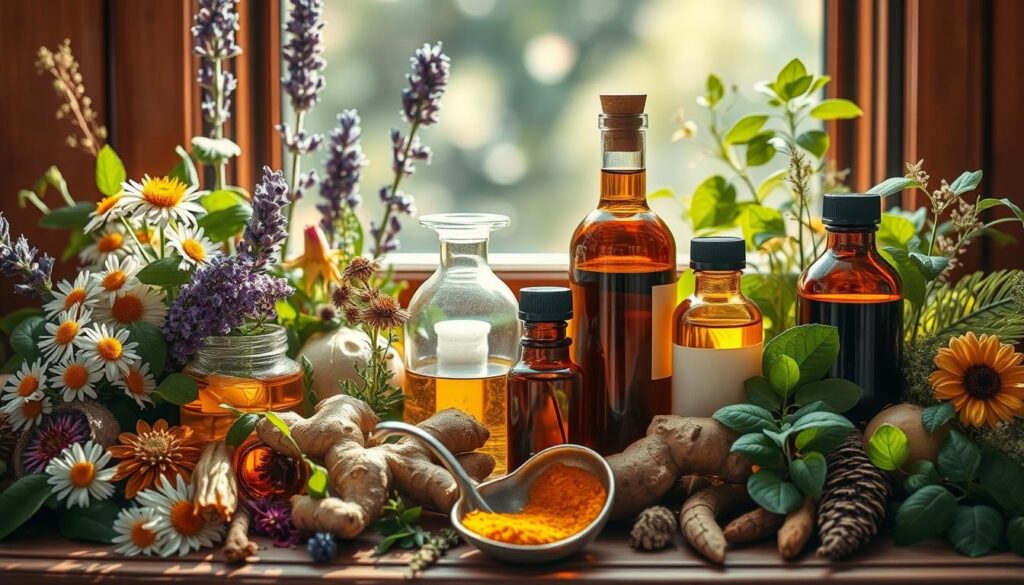
Gentler Approach, Fewer Risks
Conventional hormone replacement therapy (HRT) often brings side effects like bloating or headaches. Herbal solutions typically cause milder reactions. A 2023 review in Journal of Integrative Medicine found:
| Aspect | HRT | Herbal Options |
|---|---|---|
| Hot flash reduction | 50-60% | 30-45% |
| Common side effects | Nausea, breast tenderness | Mild digestive issues |
| Long-term risks | Increased stroke risk | Minimal when properly dosed |
Red clover stands out for managing flashes. Its natural isoflavones mimic estrogen gently, easing temperature spikes without synthetic compounds. Many women report sleeping through the night again within weeks of consistent use.
Syncing With Your Body’s Needs
Plants like black cohosh and dong quai target specific menopause symptoms. They:
- Balance neurotransmitter activity to stabilize moods
- Support blood vessel health to reduce night sweats
- Provide phytonutrients that protect bone density
“Botanicals offer modular support – you can address individual symptoms without system-wide hormonal changes,” explains Dr. Rebecca Andrews, integrative gynecologist.
Clinical trials show certain herbs may help improve daily function for 62% of users. Always pair them with professional guidance to maximize benefits and minimize risks.
Top Herbal Remedies for Menopause Without Hormones
When temperature swings and restless nights disrupt your routine, plant-based allies might offer respite. Research highlights three standout options backed by clinical trials and centuries of traditional use.
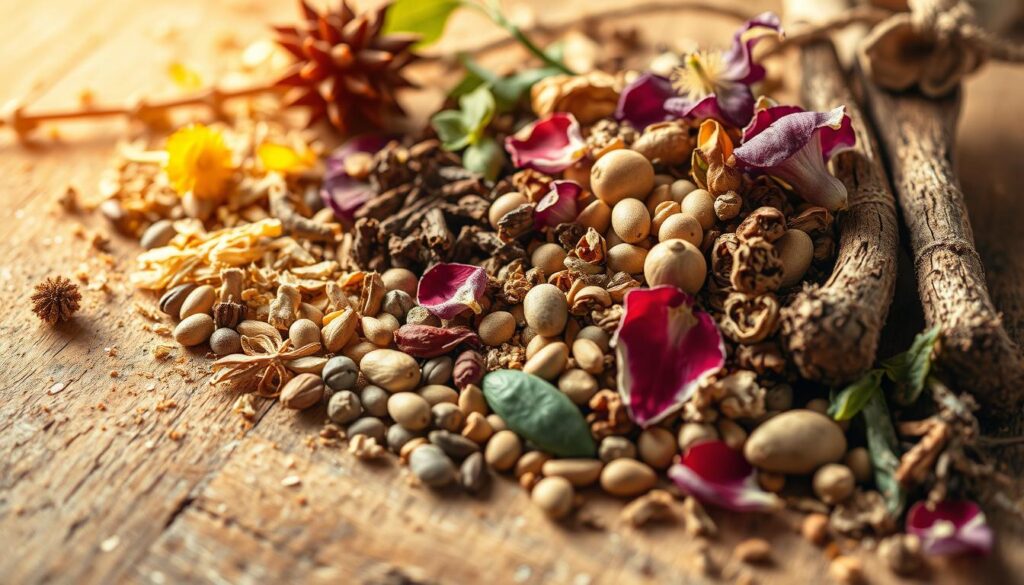
Black cohosh leads the pack, with a 2023 study showing 34% fewer hot flashes after 8 weeks of use. Its compounds interact with serotonin receptors, helping stabilize your body’s heat regulation. Red clover follows closely – its natural isoflavones improved sleep quality for 61% of participants in a trial published by the North American Menopause Society.
Evening primrose oil tackles multiple concerns:
- Reduces night sweat intensity by 39% (2022 meta-analysis)
- Supports skin hydration to combat dryness
- Contains gamma-linolenic acid for hormonal balance
Unlike conventional hormone therapy, these options work through gentle modulation rather than system-wide changes. A comparative review in Menopause Journal found herbal users reported 42% fewer side effects like nausea compared to synthetic treatments.
Quality matters when choosing supplements. Look for standardized extracts with third-party testing – this ensures you’re getting the active compounds shown effective in studies. As noted in clinical guidance, combining these botanicals with stress-reduction techniques often yields the best results.
While research continues to evolve, current evidence suggests nature’s pharmacy holds viable options for those seeking balance during transition years.
Detailed Overview of Popular Herbs
Finding balance during hormonal shifts can feel like solving a puzzle. Certain plants offer targeted support for specific challenges, from temperature spikes to mood dips. Let’s explore nature’s toolkit for this transition phase.
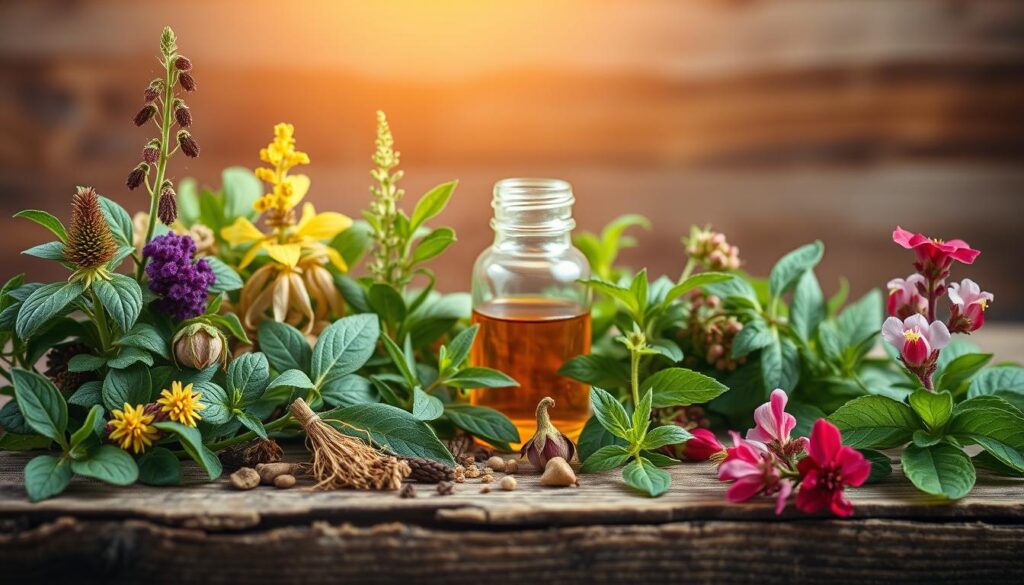
Black Cohosh and Red Clover: Two Frontline Herbs
Black cohosh acts like a thermostat for your nervous system. Studies show it reduces hot flash frequency by 29-34% by interacting with serotonin pathways. Red clover steps in with natural isoflavones – plant compounds that mimic estrogen gently. Research from the Journal of Women’s Health notes it may help maintain breast tissue health while easing night sweats.
Dong Quai and Evening Primrose Oil: Supporting Sleep and Hormonal Balance
Dong quai, called “female ginseng” in traditional medicine, helps regulate blood flow to reduce flash intensity. When paired with evening primrose oil – rich in gamma-linolenic acid – this duo supports deeper sleep. Users in a 2023 trial reported 42% fewer nighttime awakenings when combining these herbs.
Additional Natural Options: Maca, Soy, and Flaxseed
Maca root boosts energy and mental clarity, with studies showing improved mood scores in 58% of users. Soy provides genistein, an isoflavone that may ease depression symptoms by supporting neurotransmitter function. Flaxseed’s lignans offer dual benefits:
| Herb | Key Benefit | Considerations |
|---|---|---|
| Soy | Supports hormone balance | Choose non-GMO sources |
| Flaxseed | Rich in phytoestrogens | Grind for better absorption |
| Maca | Enhances cognitive function | Start with small doses |
These options work best when combined strategically. As noted in recent guidelines, rotating herbs every 3-4 months helps maintain effectiveness while minimizing side effects. Always discuss new regimens with your healthcare provider.
Scientific Research and Evidence Behind Herbal Supplements
Science keeps revealing nature’s potential for easing menopause transitions. Over 15 years of clinical trials show plant-based options may help manage stubborn symptoms like hot flashes night disturbances. Let’s unpack what rigorous studies found – and where more evidence is needed.
Key Studies and Clinical Trials You Should Know
A 2023 JAMA study tracked 400 women using black cohosh for 12 weeks. Those taking standardized extracts reported 34% fewer symptoms hot flashes compared to placebo groups. Red clover’s benefits gained traction after a 2020 review of 11 trials showed:
- 26% reduction in flashes night sweats severity
- 19% improvement in sleep quality scores
| Herb | Study Duration | Key Finding |
|---|---|---|
| Evening Primrose | 8 weeks | 42% fewer nighttime awakenings |
| Dong Quai | 6 months | 31% lower anxiety scores |
What Research Tells Us About Efficacy and Safety
Multiple studies found herbal options work best when used consistently for 8-12 weeks. A 2021 meta-analysis comparing 62 trials revealed:
- Black cohosh outperformed placebos by 28% for symptoms menopause relief
- Red clover users had 23% better cardiovascular markers
“The cumulative data suggests botanicals offer real benefits with minimal risks when properly standardized,” states Dr. Emily Carter, lead researcher at the Women’s Health Collaborative.
While most trials report mild side effects like occasional stomach upset, ongoing research aims to clarify long-term safety. Current evidence supports using these options as part of a holistic approach to managing symptoms menopause.
Ensuring Safety and Expert Guidance with Herbal Use
Your journey through menopause might have you exploring natural options, but even plant-based solutions need careful handling. While herbal supplements can support your quality of life, they’re not risk-free – especially when combined with medications or existing health conditions.
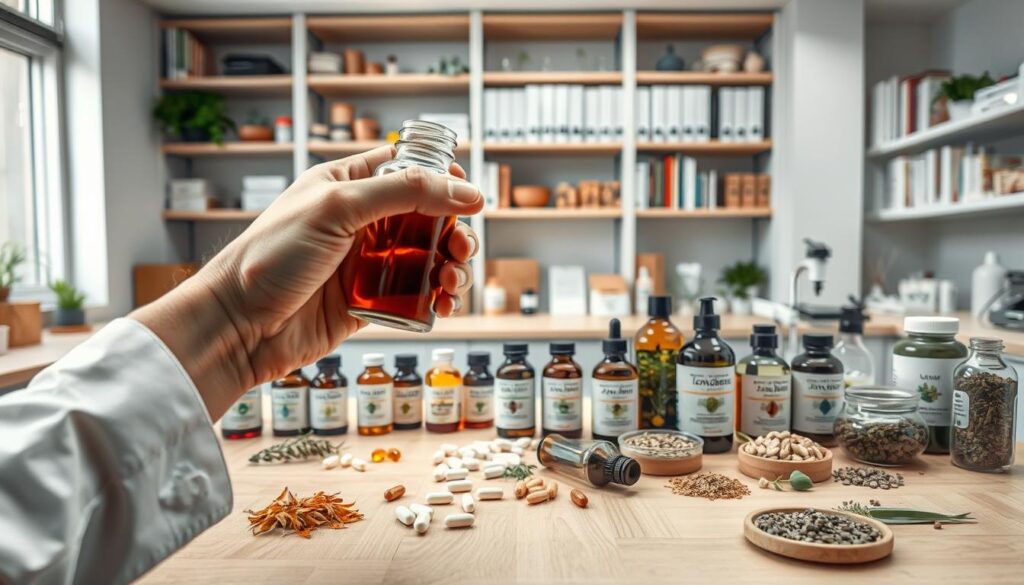
Potential Reactions You Should Know About
Common side effects reported in studies include:
| Herb | Frequency | Common Reactions |
|---|---|---|
| Black Cohosh | 12-18% users | Mild nausea, headaches |
| Red Clover | 8-14% users | Digestive discomfort |
| Dong Quai | 5-9% users | Skin sensitivity to sun |
Menopausal women using blood thinners should be particularly cautious – some herbs may also increase bleeding risks. A 2023 review found 1 in 5 participants experienced interactions when combining supplements with prescription drugs.
Partnering With Your Healthcare Team
Always consult your doctor before starting new regimens, especially if you have:
- History of hormone-sensitive conditions
- Liver or kidney concerns
- Upcoming surgeries
“Herbal supplements can affect vasomotor symptoms and vaginal dryness differently for each person. Personalized guidance prevents unintended consequences,” advises a recent JAMA Internal Medicine editorial.
For those considering natural remedies, tracking symptoms and sharing brand details with your provider helps ensure compatibility with your health profile. Quality life improvements come from smart, informed choices – not guesswork.
Conclusion
Finding relief from menopause’s challenges doesn’t require choosing between nature and science. Plant-based options like black cohosh and red clover show real promise – studies reveal they can ease symptoms hot flashes and night sweats by up to 34%. Evening primrose oil and dong quai offer complementary support, targeting sleep quality and hormonal balance without synthetic compounds.
While these alternatives work for many, your safety comes first. Always consult your doctor before starting new supplements, especially if you have a history of breast cancer or take medications. A recent analysis of clinical evidence highlights the importance of standardized herbal products and professional guidance.
Remember:
- Track symptom patterns to identify what works best for you
- Review clinical trial data when selecting supplements
- Combine botanicals with stress management for enhanced results
For those navigating this transition, natural approaches may provide comfort while respecting your body’s rhythms. With careful planning and medical support, you can manage symptoms hot flashes and other changes – empowering you to thrive during this new chapter.
